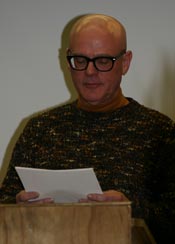Trent University's 11th annual Humanities Research Day on December 15, saw 10 faculty members discuss their research on a wide range of topics - everything from Dante and humour, to flood and famine relief in French Colonial Vietnam.
"This day is all about showcasing the work that is being done in the Humanities at Trent," says Prof. Leonard Conolly, Interim Principal, Traill College, adding this year's researchers represented disciplines including Ancient History and Classics, Modern Languages and Literatures, English, Canadian Studies, Philosophy, History, Cultural Studies and, Theory, Culture and Politics.
Prof. James Parker, Vice-President (Research) was among those who welcomed guests to Humanities Day. He took the opportunity to highlight Trent faculty members' success in attracting Social Sciences and Humanities Research Council (SSHRC) funding. Meanwhile Prof. Susan Apostle-Clark, Vice-President (Academic), spoke of the importance of humanities researchers and their work, to Trent. "You are a very vital part of the institution," she said.
The following are the abstracts of the research presented at Humanities Day:
Rodney Fitzsimmons (Ancient History & Classics) - An Early Greek Polis in East Crete: Excavations at Azoria, Crete, 2002–2004
Excavations conducted at Azoria on Crete have produced remains spanning the Neolithic through Hellenistic periods. The principal phase of occupation dates to the Archaic Period, when Greece was undergoing dramatic socio-political transformations. The finds coming to light here provide valuable insight into such important phenomena as changing subsistence patterns, state formation and urbanization.
 Roy Hagman (Modern Languages & Literatures) – Dante as Linguist Roy Hagman (Modern Languages & Literatures) – Dante as Linguist
Dante's position as the greatest Italian poet overshadows his remarkable contributions to linguistics and dialectology. His De vulgari eloquentia contains a description of language change and differentiation five centuries ahead of his time. The most fascinating aspect of Dante's work is how he situates linguistic observations in a medieval Christian worldview, drawing conclusions that we would accept today from scriptural premises.
Michael H. Epp (English) – Uncanny Durability: Minstrelsy, Repetition, and American Humour Studies
Taking a curious moment in film history as its point of departure, this paper pressures the profoundly durable articulation of humour practice to identity and "national character," investigating what might be at stake for literary writers, academics and filmmakers when they repeat stereotypes and exceptionalist narratives that refuse to go away.
Michele Lacombe (Canadian Studies) – From Pigoons to Rakunks: Cyborg Identities in Margaret Atwood's Oryx and Crake
My reading of Oryx and Crake takes its cue from Donna Haraway's "A Manifesto for Cyborgs." If cyborgs are "creatures simultaneously animal and machine," blurring the boundaries between the physical and the non-physical, and if in this sense we are all cyborgs, then what should we make of pigoons, rakunks, Crakers and Snowman?
Fred Tromly (English) – Rescuing Fathers, by Freud and Shakespeare
Sons rescuing fathers is a central motif in Shakespeare. This may reflect the stress on filial obedience in Elizabethan England, but there are always subversive elements in the rescue scenes. In an off-the-cuff comment, Freud relates aggression in rescue dreams to the debts a son has been told he owes his father. This may help to clarify the ambivalence of the dramatist's handling of fathers and sons.
Moira Howes (Philosophy) – Research in Reproductive Immunology: Passivity and Pathology
Some consider the field of reproductive immunology increasingly relevant to the fertility industry. In my research, I make explicit some of the problematic assumptions that inform theoretical modelling and experimental practice concerning the immunology of conception and pregnancy. Given these problematic assumptions, I argue that reproductive immunologists who are already trying to treat infertility immunologically should exercise greater caution.
Van Nguyen-Marshall (History) – Flood and Famine Relief in French Colonial Vietnam (1920s–1930s)
This paper examines Vietnamese relief activities and explores the meanings the Vietnamese ascribed to these activities. Philanthropic and charitable organizations often appeared apolitical and even pro-French in the early twentieth century. Nevertheless, the discourses and activities relating to flood and famine relief often included an anti-colonial dimension. In fact, famine relief struck at the very foundation of French colonial doctrine, challenging the notion of a French "civilizing" mission.
Martha Crealock (Theory, Culture & Politics) – Post-Modern Passion, or What Does Mel Gibson Make an Image of When He Makes an Image of God?
If we understand that we are in a Post-Christian time and place, and that "God is dead," then what are we to make of the blockbuster success of The Passion of the Christ? Perhaps we can turn to (literary) theory again, to make a marriage of heaven and hell, or of Christian theology and contemporary thought.
James Penney (Cultural Studies) – Beyond Queer Theory: Sex, Universality, Representation
What happens to the assumptions of queer theory when confronted with the psychoanalytic concept of the unconscious? My intervention examines how psychoanalysis problematizes a number of queer discourse's basic assumptions, including the "construction" of sex, and the relation of sex-identity to general political antagonisms as well as "the universal."
Davide Panagia – The Piazza, The Edicola, and the Noise of the Utterance
The paper examines the linguistic turn's typographical bias by introducing a theory of the utterance attentive to its aural features. Relying on the work of Ranci*re, de Certeau, Kandinsky, and Bakhtin, I argue that the noise of democratic culture, surmised from structures like the Italian piazza and edicola (newsstand), permits an appreciation of democratic non-sense: a mode of "claim-making" outside the shared lexicon of deliberation.
Humanities Day sessions were moderated by Ian Storey (Ancient History & Classics), James Neufeld (English), Christine McKinnon (Philosophy), and Veronica Hollinger (Cultural Studies).
Posted December 20, 2004
|

